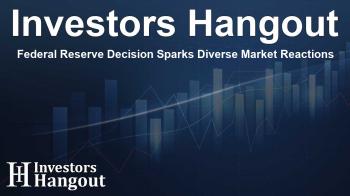Federal Reserve Decision Sparks Diverse Market Reactions

Federal Reserve Maintains Interest Rates Amid Economic Pressures
Analysts and experts are responding to the Federal Reserve's recent decision to keep its benchmark interest rate unchanged at 4.25% to 4.50%. This decision comes amidst increasing pressure from various sectors to initiate aggressive rate cuts. Many are eager to see the effects of global economic conditions being influenced by both domestic and international factors.
Insights from Economists: Understanding the Market Shifts
Prominent economist Mohamed El-Erian highlighted the significance of the post-FOMC press conference on market movements. He remarked that the actual outcomes of the meeting may not sway the markets as much as the insights shared by Federal Reserve Chair Jerome Powell during his remarks.
Market Reactions to Fed Decisions
El-Erian, who serves as Chief Economic Adviser at Allianz, noted that the Fed's statements have historically influenced market trends where stocks often decline, bond yields rise, and the dollar strengthens. He observed that Powell displayed a more hawkish stance on future policy rates than many analysts had anticipated, demonstrating the Fed’s willingness to maintain elevated rates if necessary.
Analyzing the Current Economic Landscape
In the wake of the Fed's decision, former Boston Fed President Eric Rosengren revealed that clear forward guidance was absent from the latest meeting. He cited the ongoing tight labor market, suggesting that unemployment levels remain at full employment, while inflation consistently hovers above the Fed's 2% target.
The Data-Dependent Approach of Policymakers
Rosengren indicated that policymakers are likely to adopt a cautious, data-driven approach rather than committing to a predestined trajectory for rate adjustments, signaling uncertainty as they continue to monitor evolving economic indicators.
Historic Dissent in the Fed's Decision
Ashish Shah from Goldman Sachs emphasized the unprecedented dissent within the Federal Open Market Committee, marking the first time since 1993 that the board's decision was not unanimous, resulting in a 9-2 vote. This division indicates significant variations in perspectives among the governors concerning the direction of monetary policy.
Implications of Dissenting Opinions
Shah noted that Governors Bowman and Waller expressed more dovish views while the majority of the FOMC preferred to remain cautious in the wake of ongoing economic developments.
Political Influence on Monetary Policy
Powell previously informed Congress that the Fed's near-term policy uncertainty heavily hinges on tariffs imposed by the current administration. He noted that rising tariffs could potentially elevate prices and negatively impact economic activity, adding layers of complexity to the Fed's decision-making process.
President Trump's Influence on Federal Monetary Policy
President Trump, while voicing his discontent with recent rate decisions, assured that firing Powell was unnecessary. He further stated his strong preference for lower interest rates during his visit to the Fed's headquarters, where he continued to advocate for proactive monetary policies.
Conclusion: What Lies Ahead
As the Federal Reserve navigates uncertain waters, the implications of their decisions will resonate throughout various markets, boasting a significant impact on investment strategies moving forward. Investors should stay informed of the shifts within the economy as policymakers assess the evolving landscape.
Frequently Asked Questions
What was the Federal Reserve's recent decision regarding interest rates?
The Federal Reserve decided to maintain the benchmark interest rate within the range of 4.25% to 4.50% amidst various economic pressures.
How did economists respond to the Fed's decision?
Economists noted that the Fed's conference post-meeting tends to have a larger impact on markets than the meeting outcomes, highlighting a hawkish tone from Chair Powell.
What were the implications of the dissenting vote in the Fed?
The dissenting vote, marking the first time since 1993, indicated divided opinions among the governors on future monetary policy, with varied approaches toward rate changes.
What role does politics play in the Federal Reserve's decision-making?
Political pressures, particularly from President Trump regarding tariffs and rate cuts, have influenced the Fed's monetary policy approach.
What should investors consider moving forward?
Investors should closely monitor economic indicators and Federal Reserve communications, as decisions made today will significantly affect market conditions and investment strategies.
About The Author
Contact Riley Hayes privately here. Or send an email with ATTN: Riley Hayes as the subject to contact@investorshangout.com.
About Investors Hangout
Investors Hangout is a leading online stock forum for financial discussion and learning, offering a wide range of free tools and resources. It draws in traders of all levels, who exchange market knowledge, investigate trading tactics, and keep an eye on industry developments in real time. Featuring financial articles, stock message boards, quotes, charts, company profiles, and live news updates. Through cooperative learning and a wealth of informational resources, it helps users from novices creating their first portfolios to experts honing their techniques. Join Investors Hangout today: https://investorshangout.com/
The content of this article is based on factual, publicly available information and does not represent legal, financial, or investment advice. Investors Hangout does not offer financial advice, and the author is not a licensed financial advisor. Consult a qualified advisor before making any financial or investment decisions based on this article. This article should not be considered advice to purchase, sell, or hold any securities or other investments. If any of the material provided here is inaccurate, please contact us for corrections.

